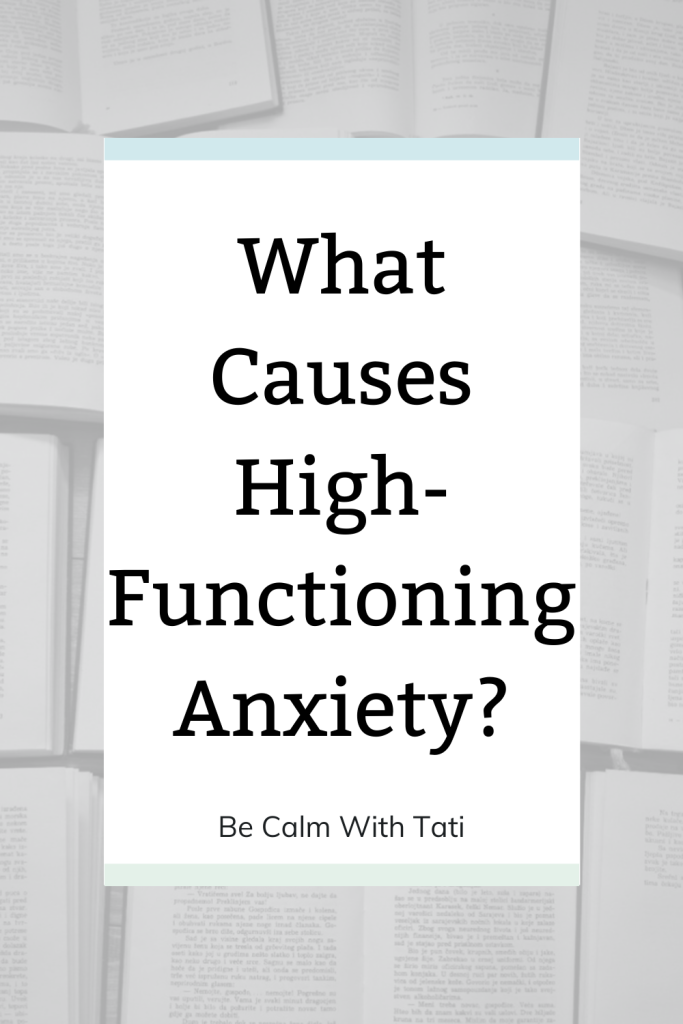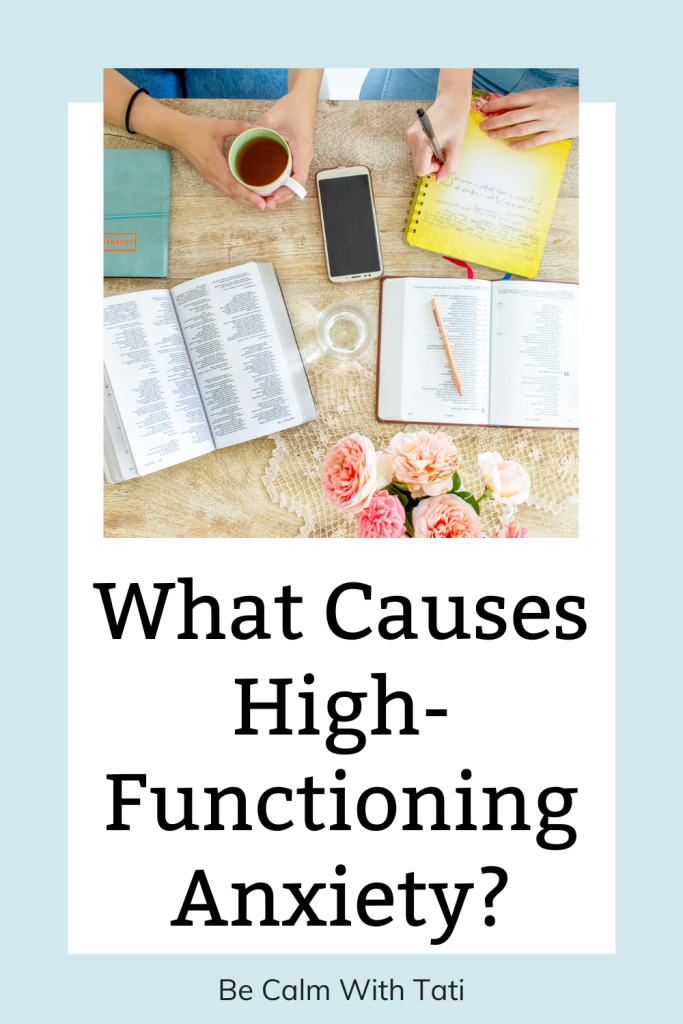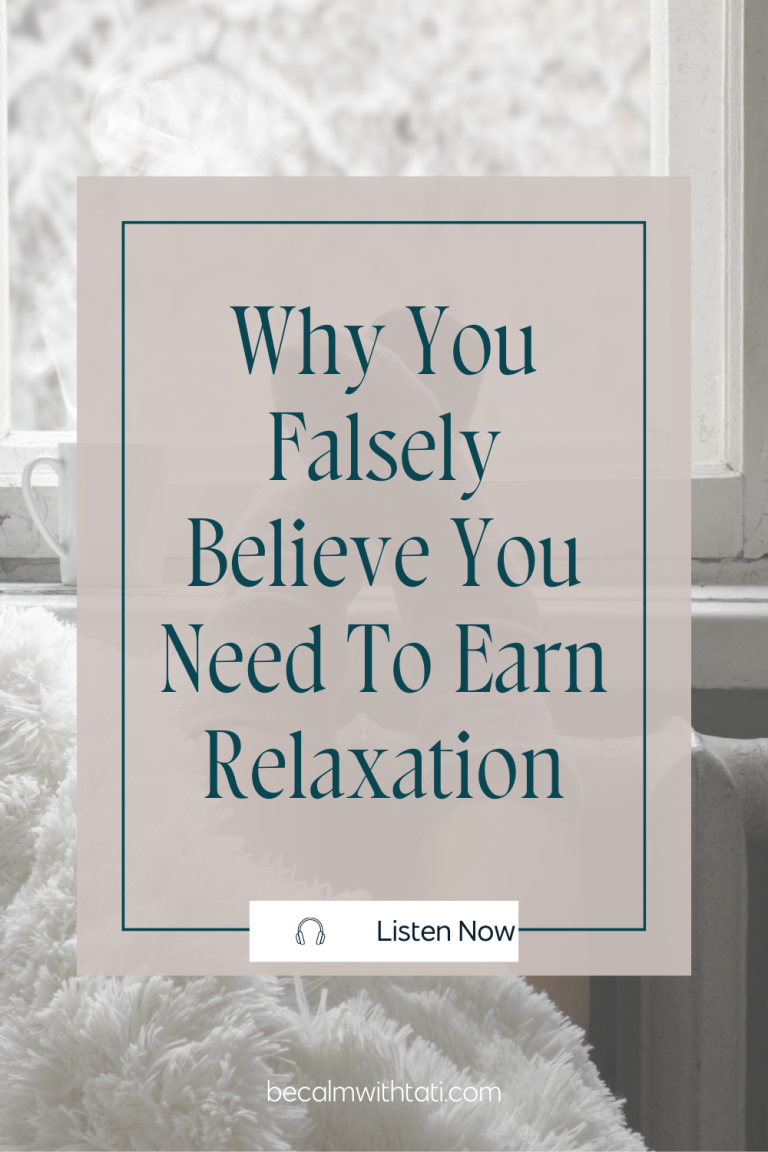High-functioning anxiety is not a diagnosable mental disorder, therefore there is a lack of research when it comes to the specifics of high-functioning anxiety.
However, this phrase has come about to describe individuals who are high-performing and high-achieving but they struggle with anxiety within. You might try to hide your anxiety from others and as a result appear calm and confident on the outside, making it difficult for others to understand that you are really struggling on the inside.
You might struggle with symptoms such as:
- Worry, fear, and anxiety
- Irritability and frustration
- An inability to relax
- A need for perfectionism
- Overachieving
- Fear of failure or judgment
- A desire to keep busy all the time
- Overthinking and overanalyzing
- Anticipatory anxiety (anxiety before events)
- Elevated heart rate and faster breathing
- Sleep problems
- Changes in appetite
- Digestive issues
Is High-Functioning Anxiety An Anxiety Disorder?
The reason why high-functioning anxiety is different from an anxiety disorder is that oftentimes people with high-functioning anxiety do not meet the criteria for a mental disorder. That’s because the criteria for any mental health disorder includes that it must, “cause clinically significant distress or impairment in social, occupational, or other important areas of functioning.” (DSM 5)
Because individuals with high-functioning anxiety are often high-performers and are able to function well socially, professionally, and in their personal lives, the anxiety can be overlooked, hidden, or even seen as helpful to you.
That’s because your anxiety and fear can be propelling you forward towards staying busy, saying yes to opportunities, and high-achievement, rather than holding you back in avoidance and inaction (which is the consequence of most anxiety disorders).
This is the main differentiation and reason why high-functioning anxiety is different from a diagnosable anxiety disorder. However, this does not mean that you do not have a mental health disorder if you identify with high-functioning anxiety. Human behavior falls on a spectrum, and depending upon whether your symptoms are mild, moderate, or severe, this can impact how difficult things feel for you, and how much the anxiety is impacting your life and may require professional mental health treatment.
What Causes High-Functioning Anxiety?
Your Learned Behaviors
So what causes high-functioning anxiety? Many times, behaviors and responses can come about because at one point they were helpful and advantageous. For example, avoiding conflict by keeping opinionated thoughts to yourself when you were a child may have helped prevent you from getting in trouble or experiencing abuse. You may have learned and carried these behaviors and responses into your interpersonal relationships in adulthood.
The types of behaviors, thoughts, and emotions that result in high-functioning anxiety are helpful and advantageous on the surface. Staying busy, always saying yes, and being high-achieving are often admired traits in our society. These behaviors may have resulted in your success and achievements in the past.
As a result, you may have learned that pushing yourself, always aiming for perfection, and trying to make the “best” choice possible is the way that you achieve the things you want in life. The problem is, that your underlying fear of failure and judgment may push you into overdrive and result in your avoidance of any signs of potential downfall.
This combination of avoiding failure, judgment, and/or uncertainty, along with your learned behaviors of overworking, overperforming, and high-achievement result in the cluster of signs and symptoms called high-functioning anxiety.
The problem with sustaining this combination of behaviors is that it is not sustainable. At some point you will need to rest and recharge. At some point you will fail and have to confront conflict. Although you may have been maintaining the dance of trying to make yourself happy along with making everybody else happy, eventually it will be impossible to do both. The fear of this happening is what leads to your anxiety, stress, and overwhelm.
Your Genetics
The nature vs. nurture debate is longstanding and often disputed. I am not here to solve this debate in the discussion of what causes high-functioning anxiety, because it is unsolvable. It is impossible to separate nature from nurture. Both influence and interact with each other to affect who you are today. You might have inherited the genetic predisposition for worrying from your mother, and you may have also learned this behavior by witnessing her worrying as a child.
Due to the lack of specific research on high-functioning anxiety, I am going to refer to research on anxiety disorders. Family and twin studies show that genetics play a significant role in anxiety disorders. A study on the genetics of generalized anxiety disorder found that it “is a heritable condition with a moderate genetic risk (heritability of approximately 30%).”
Many studies support the diathesis-stress model in psychology, which suggests that mental health struggles stem from a genetic predisposition (meaning that you inherited the likelihood to have a certain mental health struggle) along with a significant life stressor. This could be experiencing trauma or anything significantly stressful in your life that can trigger anxiety.
Examples include childhood trauma, death of a loved one, relationship stress, increased work stress, chronic stress, financial stress, etc.
What Is The Best Treatment For High-Functioning Anxiety?
The best treatment for high-functioning anxiety can vary from person to person. It will depend upon the significance of your symptoms and how well you are functioning in your life.
Therapy can help you learn ways to positively cope with your emotions, manage anxiety, have a supportive outlet to talk to, and work through past trauma and current life stressors.
Medication can help to decrease the symptoms of physical anxiety and improve mood, depending on the medication. If you are struggling with an anxiety disorder, medication can help you manage the symptoms, while therapy can help you learn the long-term skills and knowledge to cope with and prevent future anxiety.
Coaching is a great option for individuals struggling with high-functioning anxiety who do not meet the criteria for an anxiety disorder, or are currently in therapy and want increased accountability, education, and support. Working with a high-functioning anxiety coach can help you learn ways to increase calm, focus, productivity, and confidence. It is a more actionable, present-focused approach to help you maximize your potential.
The specific tools and interventions I have found works best for high-functioning anxiety and what I use with my coaching clients is a combination of mindfulness, cognitive psychology (recognizing and challenging negative beliefs and ways of thinking), energy management by setting boundaries and respecting that natural human need to recharge and rest, and self-compassion. Ultimately, the tools and interventions might vary by person and what your personal needs and preferences are.
How Can You Prevent High-Functioning Anxiety?
Awareness is the biggest step towards preventing high-functioning anxiety. You can catch yourself in the thoughts, emotions, and behaviors that lead to the cycle of overthinking, overworking, overanalyzing, and self-doubt and stop it before things get worse. Mindfulness is a great way to practice becoming more aware. With mindfulness you can also identify your personal warning signs for high-functioning anxiety in your behaviors, thoughts, and emotions.
There’s nothing wrong with you for struggling with high-functioning anxiety. The fact that you are seeking out information and support is amazing. It means that you are committed to taking care of yourself and your mental health. Understanding is the first step to making positive changes in your life.
Your action step is to become more aware of yourself from a curious and non-judgmental approach. When do you catch yourself always needing to be busy? What behaviors might you have learned from your past that have resulted in the way you approach situations today?
I’d love to hear your thoughts on what causes high-functioning anxiety and how it has affected you personally. Leave a comment below letting me know your thoughts!
Sources:
High-Functioning Anxiety Signs And Symptoms
A review and meta-analysis of the genetic epidemiology of anxiety disorders
Genetics of generalized anxiety disorder and related traits
















2 Comments
Hi Tati – thank you for this podcast. I’ve been dealing with many of the symptoms pretty much my whole life. And did not recognize or understood the cause. Now that I’ve heard your explanation of this behavior, I will work to remind myself of the cause and effect to help relieve the stressors.
Be well and let’s stay calm.
-Cory
You’re welcome, Cory! I’m glad you found it helpful and you absolutely can make changes to help relieve things and feel better!